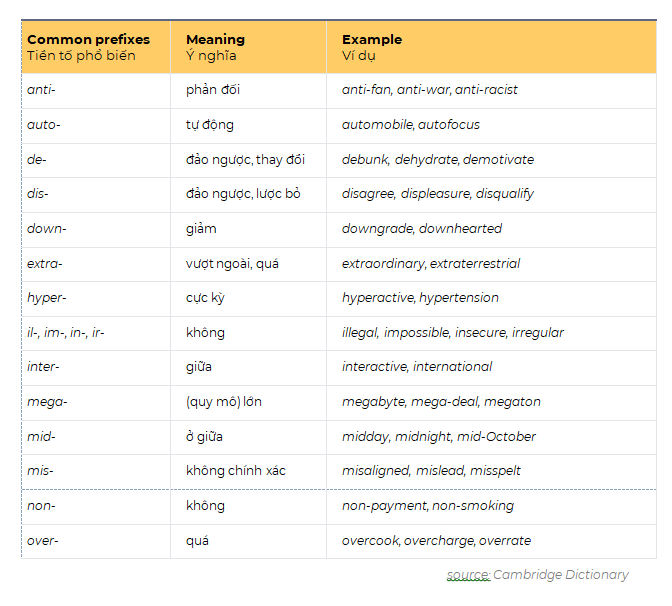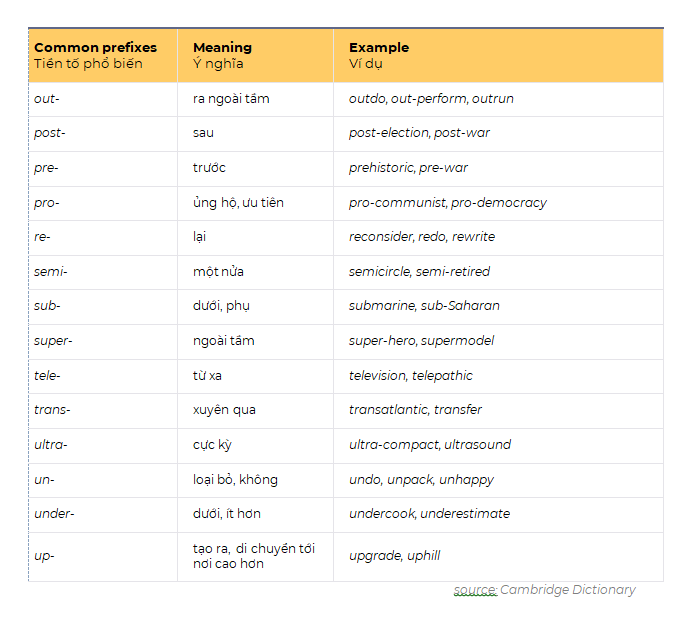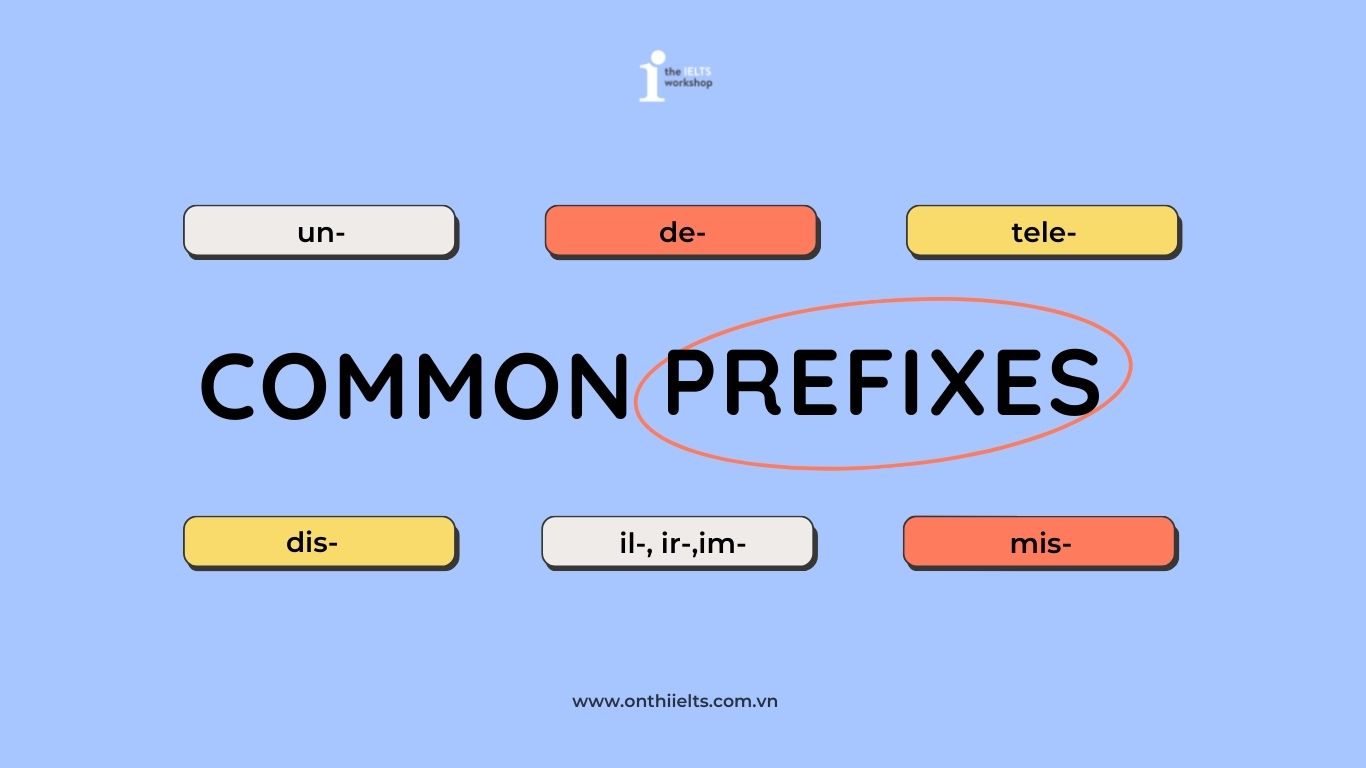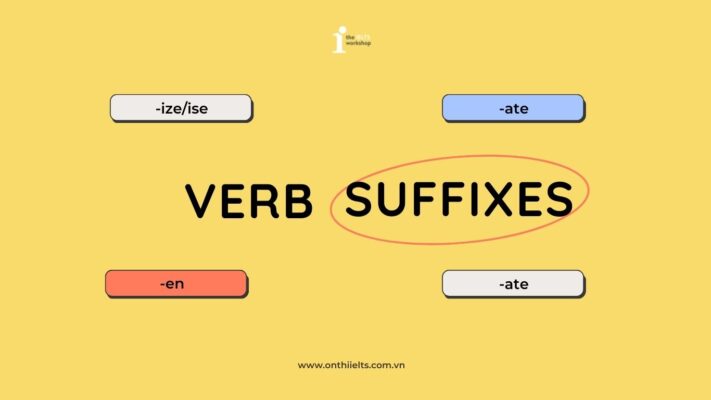Tiền tố trong tiếng Anh (Prefixes) là thành phần thêm vào trước của một từ và có khả năng làm thay đổi ý nghĩa của từ đó. Tiền tố có ý nghĩa quan trọng trong việc đoán nét nghĩa của từ. Dưới đây là danh sách các loại tiền tố phổ biến nhất trong tiếng Anh kèm ví dụ và bài tập.
1. Phân loại các tiền tố trong tiếng Anh thường gặp
Việc thêm ‘tiền tố’ vào trước một từ sẽ làm cho từ đó thay đổi ý nghĩa. Nghĩa này sẽ được cấu tạo bởi nghĩa của từ cơ sở/gốc từ và nghĩa của tiền tố.
Ví dụ: misunderstand (v)
- Tiền tố mis- có nghĩa là không chính xác, lệch hướng.
- Động từ understand có nghĩa là hiểu
Kết hợp lại, ta có misunderstanding là hiểu nhầm.
You must have misunderstood what I was trying to say (Có lẽ bạn đã hiểu nhầm ý tôi rồi)
Dưới đây là các tiền tố thông dụng kèm ý nghĩa và ví dụ:


Một số ví dụ khác:
- They were unable to make it there in time due to traffic congestion. (Họ không đến kịp do tắc đường)
- Has anyone ever really met an extraterrestrial being? (Ai đã từng nhìn thấy sinh vật ngoài hành tinh chưa?)
- The meat was undercooked and the customers looked extremely disappointed. (Món thịt chưa chín và thực khách đã rất thất vọng)
2. Bài tập tiền tố trong tiếng Anh
Bài tập 1: Chọn từ phù hợp
- She’s been (upgraded/downgraded) from principal to vice-principal.
- She works in a school for children with learning (inabilities/disabilities).
- The workers had to stop as the whole machine (malfunctioned/defunctioned).
- Food which cannot be eaten is (unedible/inedible)
- After failing the drug test, the athlete was (disqualified/unqualified).
Bài tập 2: Tìm dạng đúng của từ
- You can’t (DO) what’s already been done.
- ‘Chanel’ is among the brands which names are often (PRONOUNCE).
- The essay is full of mistakes, she will have to (WRITE) it.
- 10 million dong was given to the charity by an (KNOW) person.
- I might not like it, but I don’t (APPROVE), either.
- She has a very (REGULAR) work schedule. No one knows what hours she’ll go to work.
- It’s considered really (POLITE) to wear short skirts while visiting temples in Vietnam.
- (PAYMENT) of bills can result in a 15% charge in the next month.
- It’s (LEGAL) to drive through a red light.
- She has a very (USUAL) first name. Only 0.1 percent of the country population own it.
Đáp án
Bài tập 1:
- downgraded
- disabilities
- malfunctioned
- inedible
- disqualified
Bài tập 2:
- undo
- mispronounced
- rewrite
- unknown
- disapprove
- irregular
- non-payment
- illegal
- unsual
Xem thêm: 25 hậu tố của danh từ phổ biến trong tiếng Anh
Tạm kết
Trên đây là toàn bộ những kiến thức chi tiết nhất về tiền tố trong tiếng Anh, phân loại và bài tập vận dụng. Tham khảo thêm các kiến thức từ vựng và ngữ pháp cơ bản trong tiếng Anh tại Website của The IELTS Workshop.
Nếu bạn gặp khó khăn trong việc bắt đầu học tiếng Anh, tham khảo ngay khóa học Foundation của The IELTS Workshop để nắm vững kiến thức cơ bản và thông dụng nhé.









